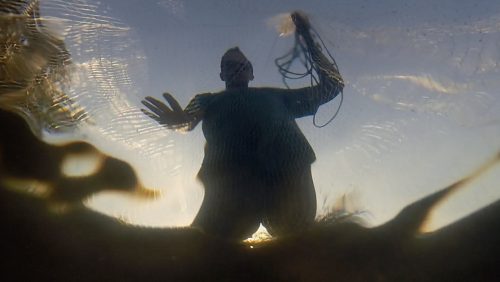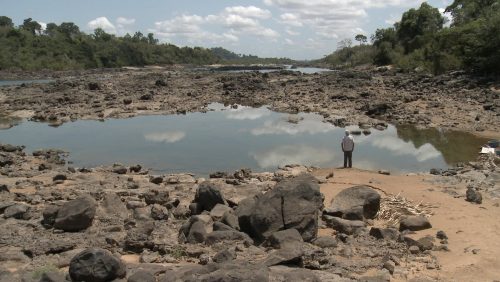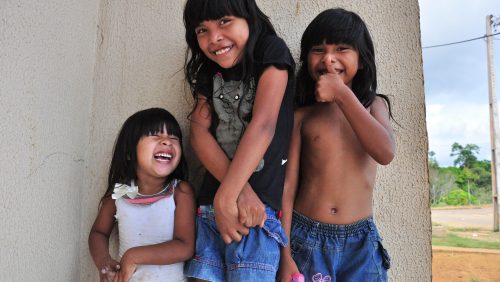River Silence
Rogério Soares
2019
| 90 min
Selections and Awards
Honourable Mention for DGC Special Jury Prize – Canadian Feature Documentary Hot Docs (Toronto, Canada) 2019
Official SelectionDocsMx (Mexico, Mexico) 2019
Selección oficialDoqumenta (Querétaro, Mexico) 2019
Official SelectionBergen internasjonale filmfestival (Norway) 2019
Official SelectionFilms from the South (FFS) (Oslo, Norway) 2019
Official SelectionFIFAC, Festival international du film documentaire Amazonie/Caraïbes (Saint Laurent du Maroni, Guyane) 2019
Official SelectionAnthropological Film Festival (Jerusalem, Israel) 2019
Official SelectionAtlantidoc - Festival internacional de cine documental de Uruguay (Canelones, Uruguay) 2019
Official SelectionFilm 4 Climate (Guadalajara, Mexico)
Official SelectionSanta Barbara International Film Festival, 2020
Crystal Hornbill for Best Documentary Rain International Nature Film Festival (Kerala, India) 2020
Official SelectionRendez-Vous Québec Cinéma (Montréal, Canada) 2020
Selections
The people who live along Brazil’s Xingu River are facing man-made Armageddon. The massive Belo Monte Dam, one of the world’s most contested infrastructure projects, has caused untold ecological and social devastation throughout the entire region, displacing more than 40,000 local residents. Director Rogerio Soares travels into this mythic and brutalized world to encounter some of its most vulnerable and inspiring inhabitants. Blending informed analysis with Baroque aesthetics and Latin American magic realism, he crafts an arresting and poetic river movie, offering a rare and deeply empathetic look into the lives of people caught in the ruinous path of “disaster development.”
The Belo Monte Dam, one of the world’s biggest and most controversial infrastructure projects, is causing massive ecological and social devastation along Brazil’s Xingu River. Director Rogerio Soares travels into this mythic and brutalized world to encounter some of its most vulnerable and inspiring inhabitants.
About the film
The Xingu River, a major tributary of the Amazon, provides lifeblood to one of the planet’s most distinctive and diverse ecosystems.
But that ecosystem and its inhabitants are now facing man-made Armageddon. One of the world’s biggest infrastructure projects, the hotly contested Belo Monte Dam, is nearing completion, part of a gargantuan plan to build more than 400 dams throughout the Amazon region.
Decried as “disaster development” at its most calamitous, Belo Monte has disrupted the entire regional watershed, causing untold social and ecological damage—and displacing over 40,000 local residents. Many have been relocated to the chaotic shantytowns of Altamira, one of Brazil’s fastest growing and most violent cities.
With River Silence, the Brazilian-born filmmaker Rogerio Soares travels deep into this mythic and brutalized world to encounter its most vulnerable and inspiring inhabitants. Blending informed analysis with deep empathy, he crafts a rare and timely look into the lives of people caught in disaster development’s ruinous path.
Composed as a poetic “river movie”—fluid, constantly in motion, sometimes gentle, at other times violent—the feature-length film focuses on four women-centred households as they struggle to navigate a critical moment in their collective history.
Francinete fends for her multigenerational family on the ragged periphery of Altamira. Tamakwera and her husband Rosinei, cut adrift from their Indigenous Parakanã culture, have been caught in the wave of aggressive evangelical Christianity that’s currently sweeping through Brazil. And while Raimunda resolves to rebuild her home and livelihood, Karliane bravely faces down the state authorities who’ve been sent to evict her and other local families from their homes.
Soares’ unique brand of observational cinema, anchored in extensive journalistic experience, is informed by Baroque aesthetics and Latin American magic realism. Looking on as a family mourns the death of an infant boy, a tiny body in a tiny white coffin, Soares presents the scene as a modern-day pietà, infusing the moment with heartbreaking sorrow and dignity.
The mesmerizing cinematography is by Glauco Bermudez and Aldo Oviedo Tejo, and the wondrously evocative soundscape is the work of Catherine Van Der Donckt, Benoît Dame and Jérémie Jones.
River Silence is co-produced by EyeSteelFilm (Bob Moore, producer) and the National Film Board of Canada (Annette Clarke, producer) in association with TVO. Executive producers are Mila Aung-Thwin and Daniel Cross for EyeSteelFilm; Annette Clarke for the NFB; and Jane Jankovic for TVO.
Director's Statement
The Amazon is a kind of spiritual home to me, a place that never stops feeding my dreams and imagination, a place that shapes my understanding of the world. I feel a deep affinity with its inhabitants, and with River Silence I wanted to accompany them somehow as they live through a kind of apocalypse.
I first visited the region as an 18-year-old. I’d grown up in the Brazilian south, a modern and very different world, and I was immediately taken with the atmosphere and narrative of the Amazon—its slow pace, its heavy rains and humidity, its unbearable heat and its many rivers. I returned later, in the 1990s, to work as a United Nations consultant, and not long after that my parents decided to move there. I have lived in many places since then—New York, London, Sydney, Paris, Toronto and, most recently, Montreal—but the Amazon remains home on some deep level.
I have made several short films about the Amazon for Al Jazeera (USA) and TV Cultura (Brazil), but River Silence is my first feature film. I think of it as a “river movie”—a film in constant flow that illustrates the changes occurring in a region that until recently was relatively untouched. But today there are very few spaces in the Amazon that have not been affected by “development.” It’s a region in constant transformation. An epic narrative is playing out there, highlighting the dichotomy between creation and destruction, life and death, happiness and sorrow, the new and the archaic.
Our story begins on the banks of the mighty Xingu River, where the world’s fourth-largest dam is nearing completion. Modern-day corporations and government bodies have taken on the role of their colonial forbearers. Bribery, corruption, violence, environmental destruction and ethnocide are commonplace—all justified in the name of economic growth.
Unlike in earlier colonial times, the pace is astonishingly rapid. In today’s globalized economy, huge changes take place in a matter of days and months, not years. In the five years since I started researching and shooting this film, I’ve witnessed these changes firsthand: disappearing fish populations, entire forests replaced by cattle ranches, riverside communities forcibly relocated to urban areas, Indigenous people resisting, armed with nothing but their voices. The Amazon is eroding quickly because its peoples, who have coexisted in this environment for centuries, are vanishing.
The film features four women: Francinete, Tamakwera, Karliane and Raimunda. Each has her own distinct story. Each has experienced her own tragedy. And each is persevering amidst massive changes. Their hope is often expressed through an appeal to the sacred, as they call upon higher powers to intercede on their behalf, to grant them salvation or redemption. The Amazon is an all-encompassing world and its peoples tend to see themselves as part of a grand scheme. Life would seem senseless without this belief in some form of divine power.
Despite the suffering we witness in River Silence, my subjects are not victims. Hope and survival are intrinsic to the story. Their love for their children and grandchildren represents their hope for a better future. Each in her extraordinary way reminds us of the daily rituals that make us human.
Trailer
Promotional Materials
Images
Loading...
 Photo: Image from Production
Photo: Image from Production
Download
Loading...

Download
Loading...
 Photo: Image from Production
Photo: Image from Production
Download
Team
Rogério Soares
Writer, Director
Photo
Photo : Katie McKay
Bob Moore
Producer (EyeSteelFilm)
Photo
Annette Clarke
Producer (NFB)
Photo
Photo : NFB
Credits
Written and directed by
Rogério Soares
Cinematography
Glauco Bermudez
Aldo Oviedo Tejo
Editor
Ryan Mullins
Composer
Nicole Lizée
Sound Design
Catherine Van Der Donckt
Benoît Dame
Jeremie Jones
Featuring (in order of appearance)
Raimunda Gomes da Silva
Tamakwera Parakanã
Karliane Lopes de Souza
Francinete Pinto Novaes
Ana Paula Pinto Novaes
with
Mandui Parakanã
Anduí Parakanã
Tutui Parakanã
Tutuia Parakanã
Maraduia Parakanã
Risonei da Silva
Fernanda Félix de Abreu
Maria Vanusa Baca da Silva
Leidiane Araújo Lopes
Adalberto Rodrigues
Humberto Lopes da Cunha
Halberto Henrique Lopes da Cunha
Halbert Lopes da Cunha
Amanda Gabryelle Lopes da Cunha
João Lucas Gomes de Lima
João Pereira da Silva
Vinicius Gomes da Silva
Andressa Pinto Novaes
Dione Madson
Matricia Cristina
Odair Oliveira
Musicians and dancers from Boi Faceiro in São Caetano de Odivelas
Line Producer
Valerie Shamash
Associate Producer
Katie McKay
Field Producer in Brazil
Patricia Lio
Location Sound
Catherine Van Der Donckt
Victor Arturo Jaramillo Quevedo
Assistant Editor
Rafael Favero
Additional Editing
Lessandro Sócrates
Additional Camera
Cezar Azevedo
Ricardo Matias
Additional Camera (Drone)
Adrio Denner Santos de Sousa
Bruno da Veiga Menezes
Research and Rights Supervisor
Edmund Duff
Post Production Supervisor
Victor Sandrasagra
Post Production Coordinator
Hamed (Ed) Aleali
Post Production Assistant
Huei Lin
On-Line Editor
Serge Verreault
Title Design
Cynthia Ouellet
Foley Artist
Stéphane Cadotte
Assistant Foley
Maya Kuroki
Foley Recording
Geoffrey Mitchell
Re-recording
Isabelle Lussier
Digital Editing Technicians
Isabelle Painchaud
Pierre Dupont
Patrick Trahan
Sound technician
Bernard Belley
Additional VFX
Hamed (Ed) Aleali
Transcription
Rafael Favero
Translation
Rafael Favero
Rogério Soares
Musicians
Nicole Lizée – Vocals, Strings, Percussion
Ben Reimer – Percussion
Jennifer Thiessen – Strings
Music Editor
Benoît Dame
Distribution and Marketing
Camille Jacques
Copywriter
Rebecca West
Accounting
Robert Hingley
NFB – Québec Atlantic Studio
Production Supervisor
Roz Power
Technical Coordinators
Jean-Francois Laprise
Daniel Lord
Christopher MacIntosh
Production Coordinators
Christine Williams
Larissa Christoforo
Marketing Manager
Johanna Lessard
Publicist
Patricia Dillon-Moore
Studio Administrators
Camila Blos
Leslie Poyntz
Legal Counsel
Dominique Aubry
Peter Kallianiotis
Producers
Annette Clarke (NFB)
Bob Moore (EyeSteelFilm)
Executive Producers
Mila Aung-Thwin
Daniel Cross
Executive Producer, TVO
Jane Jankovic
Production Executive, TVO
Linda Fong
TVO – VP Current Affairs and Documentaries
John Ferri
NFB Executive Producer Quebec Atlantic Studio
Annette Clarke
NFB Executive Director English Program
Michelle van Beusekom
Coproduced by the National Film Board of Canada and EyeSteelFilm
Produced in association with TVO
Media Relations
-
About EyeSteelFilm
Daniel Cross spent six years making his first film, THE STREET (1997). The arduous production process alternated between filming on Montreal’s gritty streets with the local homeless population, and trying to ‘find’ precious 16mm film (i.e., he had to beg, borrow and steal). As a result, ‘EyeSteelFilm’ was chosen as a company name by founders Daniel and Mila Aung-Thwin, during the making of S.P.I.T. Squeegee Punks in Traffic in 1998. The production of that film involved sharing a camera with homeless Squeegee Punk/co-director Eric “Roach” Denis, setting the tone for the company’s interactive, inclusive direct filmmaking ethos. As EyeSteelFilm began expanding, Bob Moore joined as a partner with a deft focus on international co-producing. Today, EyeSteelFilm looks to work with engaged, like-minded filmmakers from around the world who seek to engage with reality using the language of documentary cinema.
-
About the NFB
Founded in 1939, the National Film Board of Canada (NFB) is a one-of-a-kind producer, co-producer and distributor of engaging, relevant and innovative documentary and animated films. As a talent incubator, it is one of the world’s leading creative centres. The NFB has enabled Canadians to tell and hear each other’s stories for over eight decades, and its films are a reliable and accessible educational resource. The NFB is also recognized around the world for its expertise in preservation and conservation, and for its rich and vibrant collection of works, which form a pillar of Canada’s cultural heritage. To date, the NFB has produced more than 14,000 works, 7,000 of which can be streamed free of charge at nfb.ca. The NFB and its productions and co-productions have earned over 7,000 awards, including 11 Oscars and an Honorary Academy Award for overall excellence in cinema.